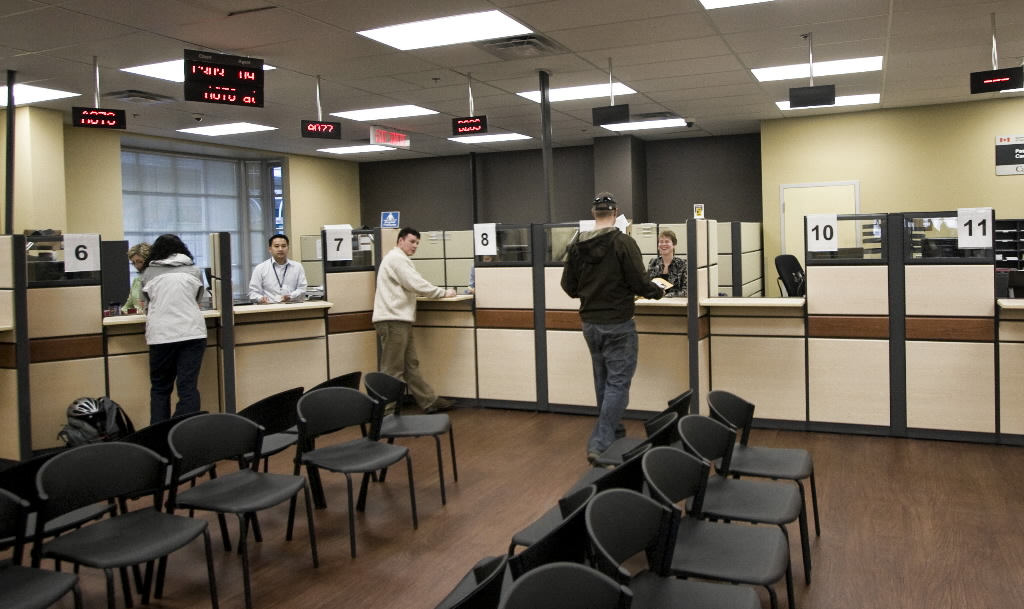OTTAWA – The agency that issues passports to Canadians is projecting a quarter of its workforce could be cut as it rolls out new chip-embedded, 10-year travel documents.

Passport Canada expects to have the equivalent of 2,512 full time staff this year, says a Department of Foreign Affairs and International Trade report.
But that number drops to 1,874 by fiscal 2015-16 in the plans and priorities report.
The agency says it expects fewer people to apply for the new, more secure travel documents by then.
“Passport Canada constantly adjusts staffing levels to respond to passport demand,” the agency says in an email to The Canadian Press.
“As such, given an anticipated drop in forecast volumes, Passport Canada expects to require fewer staff in 2015-2016.”
But if demand remains high, the planned number of staff cuts will be reduced, the agency says.
“These numbers will be adjusted as needed based on actual circumstances and within the constraints of our cost recovery business model.”
Passport Canada is grappling with a $70-million shortfall this year, and plans to balance its books within the next three years, despite projections of lower revenues.
Those projections, the agency says, don’t currently reflect fee increases that are to come into effect on July 1.

Get daily National news
The plans and priorities report issued recently indicates Passport Canada expects to spend $355.7 million in 2013-14, but will only collect $285.3 million from fees, leaving the agency short $70.4 million.
The same report anticipated spending $315.6 million in fiscal 2014-15, and revenues of $285.3 million, yet projected a zero balance by the end of the year.
Passport Canada has since changed its revenue projection to match the $315.6 million it expects to spend, calling its earlier revenue projection an “unintentional editorial error.”
And while it currently anticipates both spending and revenues to drop to $248.9 million by 2014-15, the agency says those numbers will change by this time next year because the new, higher cost of a 10-year passport hasn’t been included in its calculations.
“The expenditures shown for 2015-16 reflected the Treasury Board approved numbers prior to the approval of the passport fee increase which will come into effect on July 1, 2013,” said the agency.
“The impact of this increase will be reflected in the next RPP.”
New regulations posted in December push the cost of a five-year passport to $120 from $87 as of July.
The new 10-year ePassport, complete with embedded computer chip and distinctive historical watermark features, will cost $160.
Foreign Affairs Minister John Baird unveiled the new chip technology passports last October, saying they would be more secure, even though, outwardly, they look the same as the current booklet.
The agency is also hiking other fees, including a $45 charge on top of the regular passport fee to replace a document that’s lost, damaged or stolen.
Approximately 55,000 Canadian passports are reported lost or stolen annually, the agency said.
Canadians ordering passports from outside the country will see the biggest jump in fees. It will cost $190 to apply for, or receive, the five-year document in another country, up from $97. The fee will be $260 for the 10-year version requested under the same circumstances.
The cost of a domestically ordered child’s passport is also going up to $57, an increase of $20. That same child’s passport, if applied for outside Canada, will cost $100.
The agency noted in December that it had not increased fees for nearly a decade, and that it was losing nearly $5 every time it issued a travel document.
Passport Canada is considered a so-called “cost recovery” agency, and can only finance deficits through previously accumulated surpluses. Its current surplus is expected to run out next year.
Canada is the only G8 country that doesn’t currently issue ePassports to the general public, although it has been issuing chip-enhanced diplomatic and special passports since 2009.





Comments